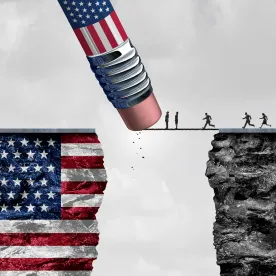As part of a policy implementing “extreme vetting” of visa applicants in order to tighten immigration controls, the Trump Administration approved a new questionnaire (Form DS-5535, Supplemental Questions for Visa Applicants) that requires applicants to provide biographical information going back 15 years and social media information for the past 5 years. The new questionnaire, approved on May 23, 2017, arises in the context of a directive dated March 6, 2017, ordering the U.S. Department of State to enhance screening procedures, and a diplomatic cable dated March 17, 2017, that ordered U.S. consulates to develop additional criteria to identify “applicant populations warranting increased scrutiny.” This cable followed several setbacks for the president’s executive orders banning entry to several African and Middle-Eastern nations, which were blocked by the courts. The executive orders have been challenged as unconstitutional.
As a result of this directive, DOS proposes the creation of a new form DS-5535, Supplemental Questions for Visa Applicants, that will be used to “more rigorously evaluate applicants for terrorism or other national security-related visa ineligibilities.” The new form would require visa applicants to provide the following information:
-
travel history during the last 15 years, including source of funding;
-
address history for the last 15 years;
-
employment history for the last 15 years;
-
all passport numbers and country of issuance held by the applicant;
-
names and dates of birth for all siblings;
-
names and dates of birth for all children;
-
names and dates of birth for all current and former spouses or civil or domestic partners;
-
social media platforms and identifiers (or handles) used during the last five years; and
-
phone numbers and email addresses used during the last five years.
Though these disclosures are ostensibly voluntary, the form also states that failure to provide all the requested information may result in a visa denial, or at a minimum “delay or prevent the processing of an individual visa application.”
The questionnaire has been implemented through a temporary, emergency procedure in response to President Trump’s mandate to enhance visa screening. The procedure implements the questionnaire for a temporary six-month period, though it is expected to become permanent. If the State Department intends to continue using the form after the temporary period, it will need to get it approved through the normal procedures, which would allow for the usual notice and comment period in the Federal Register. In the context of the previous directives, the detailed biographic and social media information is intended to help identify individuals who may have been in terrorist-controlled territories or who otherwise represent security threats and warrant “increased scrutiny.”
The State Department estimates that 65,000 visa applicants per year may be subject to such enhanced scrutiny. Requesting such detailed and extensive information dating back 15 years may make the visa application process considerably more time-consuming and error-prone. Applicants will have to take the extra time to provide accurate information to the best of their ability, as providing false information on a visa application may make the applicant inadmissible to the United States.
Employers may want to allow for additional time for the preparation of visa applications at consulates abroad and urge employees obtaining visas to be diligent in accurately providing the information requested. Employees subject to enhanced scrutiny may experience visa delays and denials preventing them from coming to work in the U.S. Because the enhanced procedures appear to be intended to give effect to the executive orders blocked by the courts, additional delays may be expected for nationals from countries designated in the suspended orders, including nationals of Iran, Libya, Somalia, Sudan, Syria, and Yemen, or anyone who has been present in ISIS-controlled territories. Employers may want to limit the international travel of valued employees already in the U.S. who may be subject to such scrutiny.





 />i
/>i
